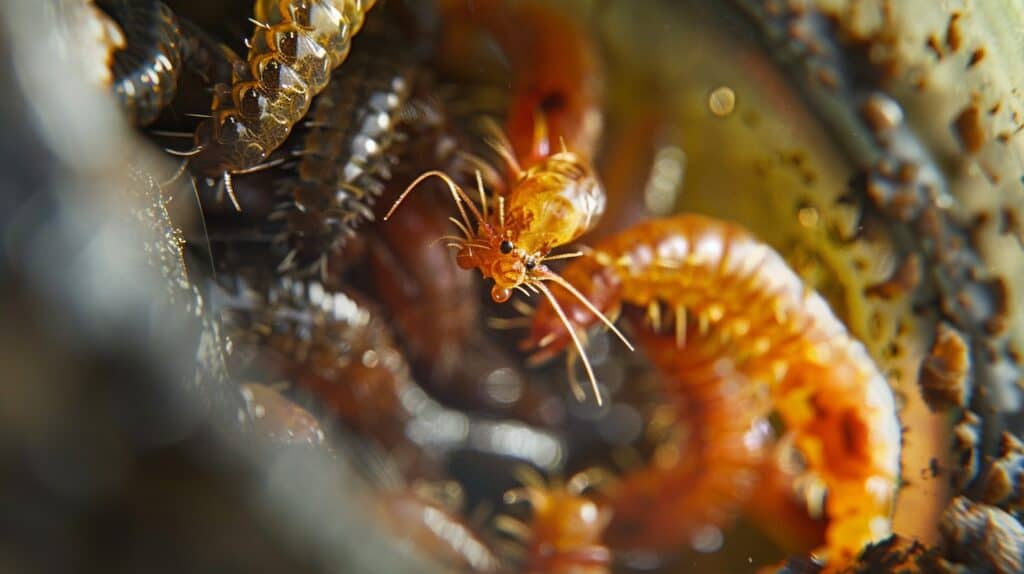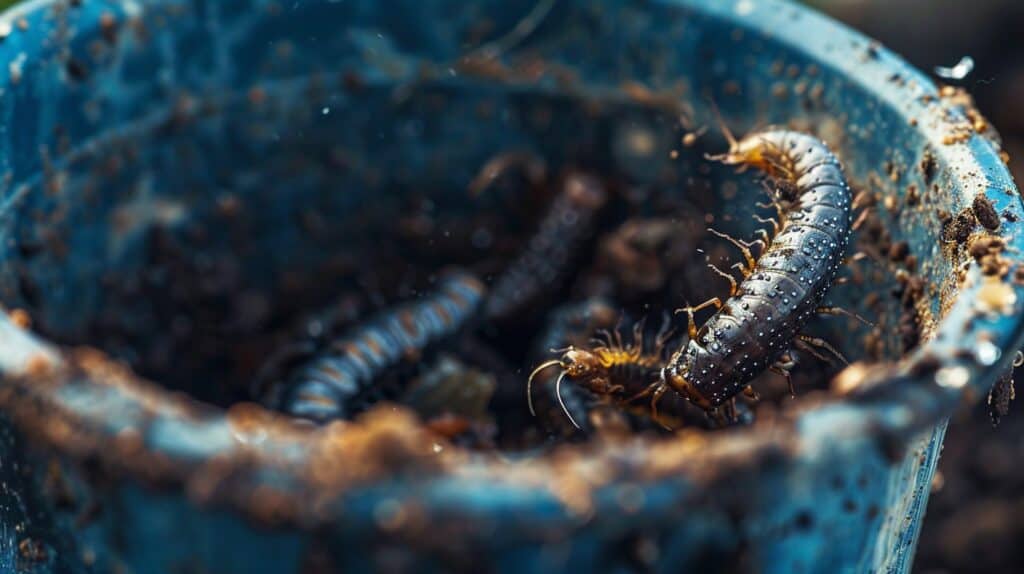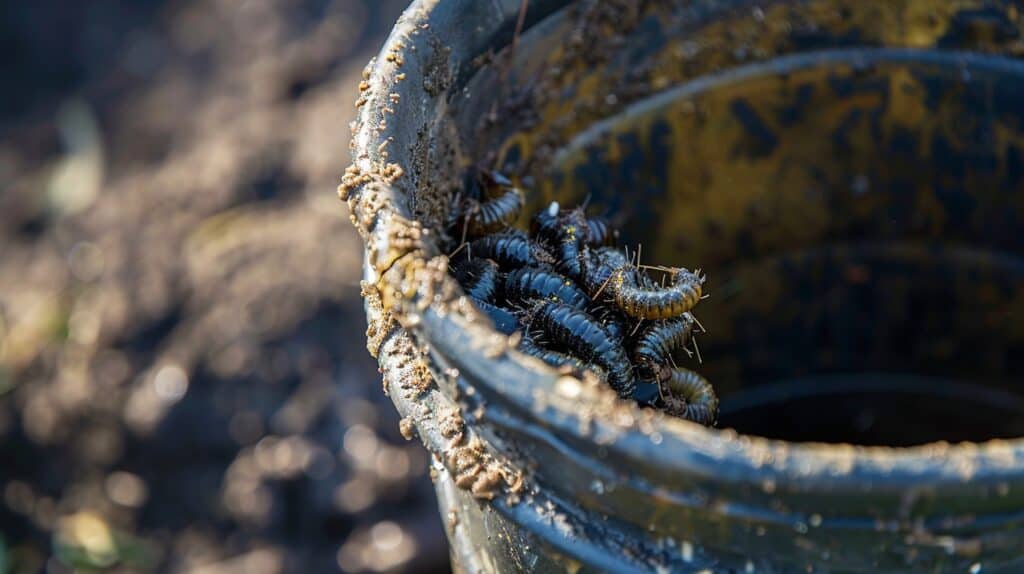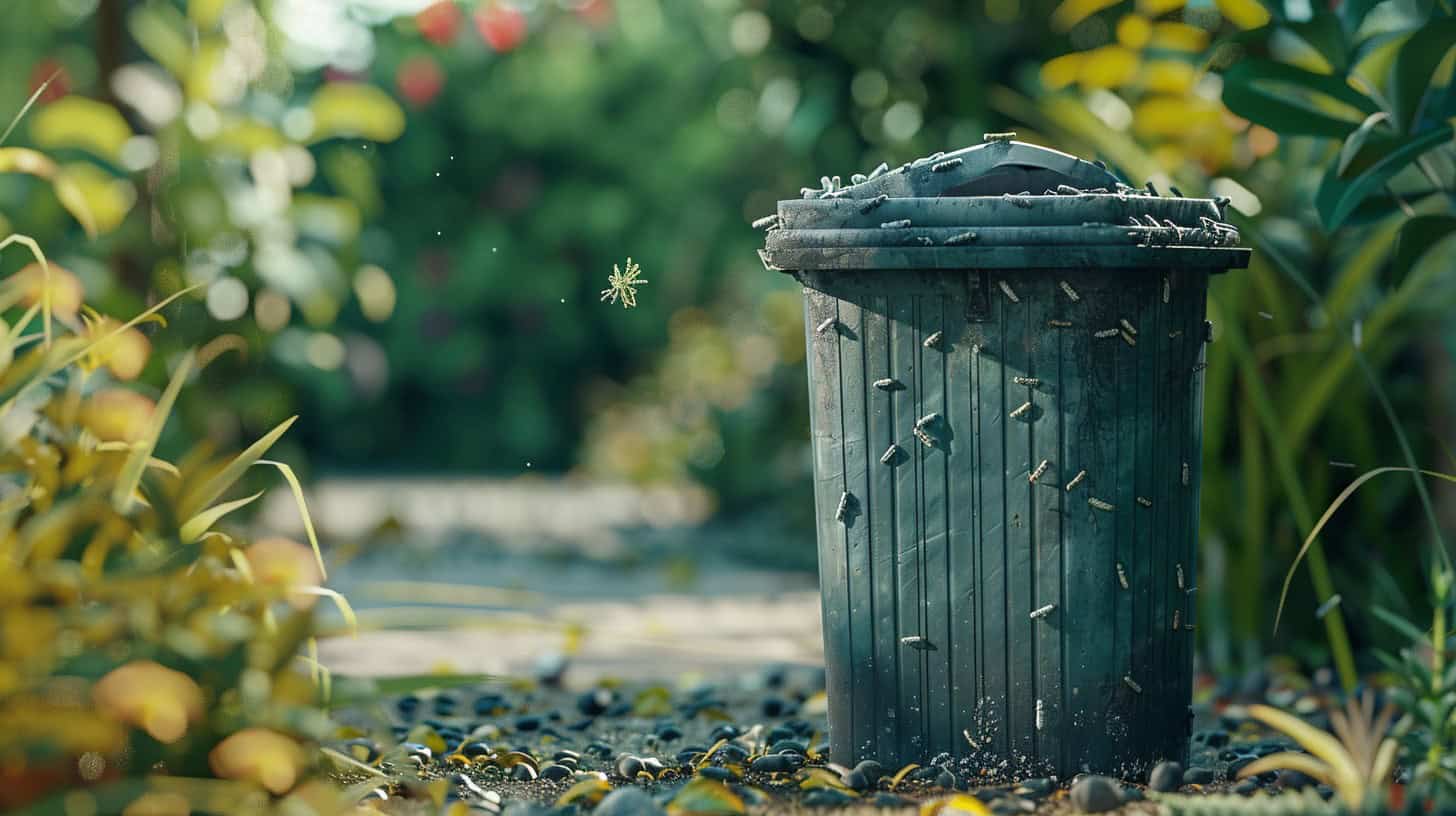Discovering maggots in your trash can is a common but unsettling issue. Maggots, the larvae of houseflies, thrive on rotting organic matter. This article will guide you through eight effective methods to eliminate them quickly.
Read on for solutions that work.
Key Takeaways
Boil water is a quick way to kill maggots and their eggs. Heat water until it bubbles, then pour it over the maggots in your trash can.
Mixing bleach with warm water or vinegar with hot water works well against maggots. Spray or pour these mixtures inside the trash can to get rid of them fast.
Salt and lime together are effective for drying out and breaking down maggot bodies. Sprinkle them on infested areas in your bin.
Use diatomaceous earth by sprinkling it on maggots if you prefer a natural solution. It dries them out without using harsh chemicals.
To prevent future maggot problems, keep your trash sealed tight and clean your bin regularly with disinfectants or a vinegar-water mix.
Table of Contents
What are Maggots, and How Do They Infest Trash Cans?

Maggots come from flies. Flies lay eggs on food leftovers in trash cans, turning them into maggots.
Definition of Maggots
Maggots are the larvae of flies that thrive on decaying organic material. They find a perfect home in trash cans filled with food waste and other biodegradable items. These critters spend 14 to 36 days feasting on decomposing matter before they transform into adult flies.
Their presence is often a sign of hygiene problems, indicating rotting food or unsealed garbage, attracting common houseflies to lay eggs.
To manage these pests, understanding their cycle from egg to fly is crucial. Maggots infesting trash cans come from eggs laid by adult flies attracted to organic waste and decaying substances.
Ensuring cleanliness and proper disposal of organic waste can significantly reduce their numbers, making pest control easier.
Common Ways Maggots Enter Trash Cans
Maggots find their way into commercial outdoor trash receptacles through a few common methods. These tiny pests are the larvae of flies, which thrive in warm and humid conditions, particularly among decaying waste, where they can lay up to 500 eggs.
- Leftover food scraps provide an ideal breeding ground. Flies are attracted to any organic waste, especially meat and fruit.
- Cracks or gaps in lids allow flies easy access. Even the smallest opening can be an entry point for a determined housefly.
- Trash not sealed properly in bags gives off odors that attract flies. It’s crucial to tie bags tightly.
- Delayed disposal of garbage lets waste accumulate, increasing the smell and allure for flies.
- Moist environments inside cans encourage maggot growth; hence, dry conditions help keep them at bay.
- Infrequent cleaning of bins creates a welcoming environment for maggots to thrive and multiply.
- Improperly covered compost bins near trash cans can also be a source of maggot infestation.
- Positioning cans too close to doors or windows might inadvertently invite flies into areas where they can sense and reach waste more easily.
Following these insights helps tackle maggot infestations by cutting off their entry points and making your trash cans less appealing to their parents—the flies.
Proven Methods to Eliminate Maggots

Getting rid of maggots doesn’t have to be hard. Boil water, spray insect killer, mix bleach with water, or use vinegar and water—each works fast.
For the simplest solution, boil some water, add a dog shampoo with Permethrin in it, and dump over any maggots. … dumping bleach into a trash can, close the lid and let the fumes of the bleach suffocate the maggots.
https://groups.google.com/g/greenyes/c/d5e4K9le4FE?pli=1
Use Boiling Water
Pour boiling water directly onto maggots to kill them fast. This method also destroys their eggs, ensuring they can’t grow or return. Heat a big pot of water until it’s bubbling hot, then carefully pour it over the maggots in your trash can.
This action ensures a quick end to the maggot problem without using harsh chemicals.
Make sure to cover every inch where you’ve seen maggots or their eggs with boiling water. Doing this makes your trash can a place where flies won’t want to lay eggs anymore. Plus, using boiling water is a simple and effective way that doesn’t require special tools or expensive products.
Boil, pour, and say goodbye to maggots for good.
Apply Insecticide Sprays
After boiling water has done its part, it’s time to pull out the bug sprays. Insecticide sprays like permethrin target maggots directly and efficiently. You spray directly into your trash can, hitting all surfaces.
These bug killers are serious stuff—they stop maggots fast. Always follow the label for safety.
For a deep clean, mix these sprays with other cleaning agents you have around. This way, you not only kill maggots but also prevent them from coming back soon. I’ve used this method myself—spray, wait a bit, then rinse the can out.
It works every time to keep those pests away and my trash can clean.
Create a Bleach Solution
Mix bleach with warm water in a ratio that works. This mix is powerful for killing maggots fast. Pour or spray it directly inside your trash can, covering all surfaces. The solution does its job quickly, leaving no survivors.
You’ll see the results right away, making this method reliable and efficient.
For effectiveness, use a spray bottle to apply this mixture evenly across all parts of the bin. This ensures that every corner and crevice gets treated, eliminating any hidden maggots.
Regular use prevents future infestations, keeping your garbage can clean and maggot-free.
Mix Vinegar and Water
Mix vinegar and hot water to spray inside your trash can. This mixture, a home remedy, sure kills maggots fast. Take equal parts of vinegar and boiling water. Put them in a spray bottle.
Then, give your trash can a good spray inside. Scrub well to make sure you get rid of all the maggots.
Next up is combining salt and lime for another effective method.
Vinegar, when mixed with hot water, becomes a powerful tool against maggot infestation.
Combine Salt and Lime
Moving from vinegar, another powerful method involves salt and lime. This combination proves deadly for maggots. Sprinkle equal parts of salt and lime over the infested areas in your trash can.
The harsh minerals in salt dry out maggots upon contact, while lime’s acidic nature breaks down their bodies quickly. This method not only kills existing larvae but also prevents future outbreaks.
For best results, cover all visible maggots with this mix and leave it for several hours before rinsing the trash container thoroughly. By doing so, you ensure no pests survive or return to bother you again.
Using items found easily at home—salt from your kitchen shelf and lime from the fruit basket—you tackle maggot problems without resorting to chemical cleaners or calling an exterminator.
Natural Solutions for Maggot Control

For those wanting to tackle maggots without harsh chemicals, nature offers some fine tools. Things like diatomaceous earth and cold temps can turn the tide, making your bin a no-fly zone for pests.
Apply Diatomaceous Earth
Sprinkle diatomaceous earth directly on maggots. This all-natural dust kills pests by drying them out. Safe and effective, it’s a top choice in pest management. Simply cover the infested area and trash residue with a thin layer; results appear quickly.
To boost effectiveness, ensure the trash can is dry before application. Diatomaceous earth works best under dry conditions, making it an ideal solution for eliminating maggots without harmful chemicals.
Ideal for pest control in garbage cans, this method cuts down on future bug problems too.
Diatomaceous earth: Your go-to maggot killer.
Freeze the Trash Can
Freezing your trash can sounds odd, but it’s a sure way to kill maggots and their eggs. Simply move the entire can into a big freezer if you have one that fits. This method stops maggots in their tracks by making the environment too cold for them to survive.
It works because both maggots and their eggs cannot stand extreme cold temperatures.
After freezing, take out the trash can and clean it with an all-purpose cleaner. This gets rid of any remaining bugs or eggs. Make sure to dry the can thoroughly before using it again to prevent new infestations.
Freezing is not only effective, but also doesn’t use harsh chemicals, making it safe for you and the environment.
Relocate Maggots to a Compost Area
Moving maggots to a compost pile is smart. These creatures break down organic waste fast, helping with nutrient cycling. Simply scoop them up and place them in your compost area. Here, they’ll transform scraps into rich soil.
Ensure the compost bin has enough green and brown materials for balance.
Keeping your compost away from the house prevents flies from bringing more maggots to your trash can. Turn the pile often to speed up decomposition, creating useful mulch for gardens.
This method turns a maggot problem into an advantage for gardeners, promoting healthy plant growth without using chemical fertilizers or pesticides.
Steps to Prevent Maggot Infestations

To keep maggots away, make sure your trash is always sealed tight. Wash your bin often with cleaners to stop these pests from coming back.
Seal Trash Effectively
Use plastic trash bags and jumbo cart-liner garbage bags to keep your trash can clean and free from maggots. These bags act as a strong barrier, stopping flies from reaching your waste and laying eggs.
Make sure the bags are tightly sealed every time you throw something away. This simple step makes a big difference in preventing maggot infestations. Clean the cans with disinfectants regularly to kill any lingering germs or fly eggs.
Next, focus on cleaning and disinfecting the area around your trash can often.
Clean and Disinfect Regularly
Keep the trash can sparkly by mixing vinegar and water. This mix kills germs and keeps maggots away. Do it often to stop bugs before they start. Imagine a clean can without flies or smell—vinegar, an all-purpose cleaner, makes this real.
Next step, focus on throwing out organic waste right.
Dispose of Organic Waste Properly
After cleaning and disinfecting, focus shifts to organic waste disposal. This step is crucial in keeping maggots away. Use a compost bin for food scraps. This turns waste into nutrient-rich soil instead of attracting flies in the trash can.
Devices like Lomi speed up this process by breaking down organic matter fast.
Always seal food leftovers tightly before throwing them away. If composting isn’t an option, make sure to use strong can-liners in your garbage cans to prevent leaks and smells that attract pests.
By managing food storage and disposal smartly, you reduce the risk of maggot infestation significantly.
FAQs About How To Kill Maggots in a Trash Can
What kills maggots instantly in trash cans?
Pour boiling water over them; it’s quick and effective. For tougher cases, mix boiling water with an all-purpose cleaner. This combo stops them dead—fast.
Can cleaning products from my kitchen kill maggots?
Yes, absolutely! Many common cleaning products you have can kill maggots. Just spray or pour them directly onto the wriggling pests in your garbage bin.
How do I keep maggots out of my trash can for good?
First, ensure you dispose of organic waste properly—compost if possible. Seal all bags tightly before tossing them into the bin. Regularly clean your bins with a strong disinfectant to prevent future infestations.
Do mothballs help in controlling maggot problems in trash cans?
Indeed, they do! Placing mothballs at the bottom of your trash can repels flies—the common housefly being a prime culprit—from laying eggs that turn into those unwanted maggots.



This article does a thorough job of outlining methods to tackle a maggot infestation, targeting both immediate eradication and preventative measures. However, I find some suggestions, like relocating maggots to a compost area, a bit idealistic for the average person dealing with a maggot crisis in their urban or suburban home. Not everyone has the luxury of a compost pile or the patience to transport maggots. Also, it glosses over potential health risks associated with handling maggots or using boiling water in a frantic state. A bit more pragmatism in recognizing the urgency and disgust people feel when they find maggots in their trash would make the advice more relatable and actionable. Practicality often trumps ecological idealism in such scenarios.
The blog post offers a comprehensive and practical approach to tackling the unsettling issue of maggots in trash cans. Using a variety of methods ranging from boiling water, vinegar solutions, and insecticide sprays, to even more natural alternatives like diatomaceous earth and salt-lime mixtures, it provides actionable solutions tailored to different preferences and levels of infestation.
What stands out is the section on prevention. Emphasizing the importance of sealing trash effectively and maintaining cleanliness could indeed reduce much of the waste issues communities face, promoting more hygienic environments.
Furthermore, the suggestion to relocate maggots to compost areas turns a nuisance into an environmental solution, highlighting the potential for organic waste to be resourceful if managed correctly. This not only aligns with sustainable waste management practices but also encourages us to think about our impact on the environment with everyday actions. Such tips can drastically improve how we handle household waste, potentially inspiring community-wide changes towards greener habits.
Overall, the advice given here is not just about eradicating pests, but it also fosters awareness about waste impact and management, which is crucial for environmental consciousness in our daily lives. It’s refreshing to see solutions that offer both immediate results and long-term benefits for our ecosystems.